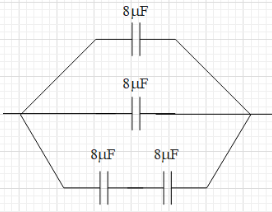Question
Question: You are provided with \(8\mu F\) capacitors. Show with help of a diagram how you will arrange the mi...
You are provided with 8μF capacitors. Show with help of a diagram how you will arrange the minimum number of them to get a resultant capacitance of 20μF.
Solution
Use the formula for the effective capacitance of ‘n’ capacitors when they are connected in series connection and parallel connection. First, try to make the effective capacitance close to 20μF and then work out for the remaining.
Formula used:
Ceff=C1+C2
where Ceff is the effective capacitance of two capacitances C1 and C2 in parallel connection.
Ceff=C1+C2C1C2
where Ceff is the effective capacitance of two capacitances C1 and C2 in series connection.
Complete step by step answer:
To solve the above given question, we will use the formulae for the effective capacitance of ‘n’ capacitors when they are either arranged in a series connection or in a parallel connection.It is said that we are provided with some capacitors with capacitance of 8μF each and we are supposed to find an arrangement of these capacitors such that the effective capacitance of the arrangement is 20μF.
First, we shall make the effective capacitor close to 20μF by connecting the capacitors in parallel connection. If we connect two of these capacitors in parallel, then the effective capacitance of the two will be equal to C1=8μF+8μF=16μF. Now, we need another capacitor of 4μF connected in parallel to these capacitors so that the three capacitances add up to 20μF.
If we connect the two capacitors of capacitance in series, the effective capacitance of the two will be C2=8μ+8μ8μ×8μ=4μF
Therefore, we can make a capacitor of 4μF by connecting two capacitors of 8μF capacitance in series. With this the final arrangement of these capacitors whose effective capacitance is equal to 20μF is as shown below.

Note: The key thing to know to solve the given problem is that when the capacitors are connected in series, the effective capacitance of the arrangement is greater than each of the capacitances. And when the capacitors are connected in parallel, the effective capacitance of the arrangement is less than each of the capacitances.
